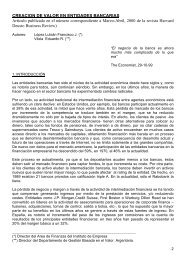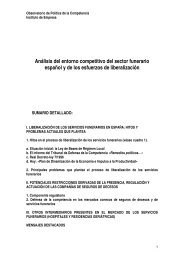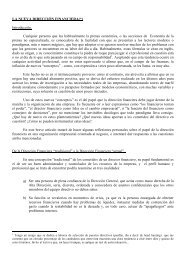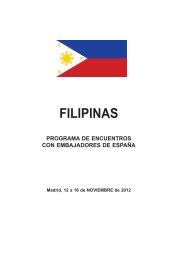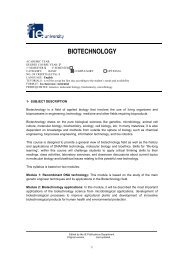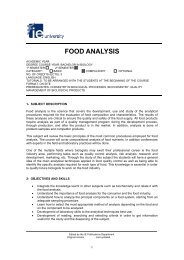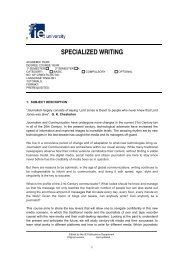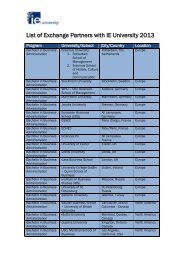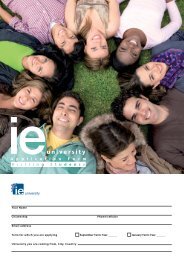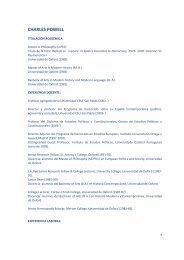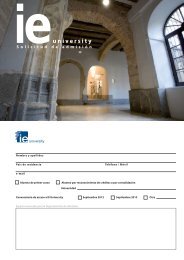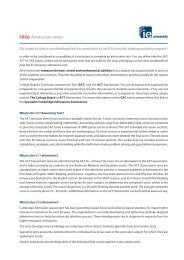HISTORY OF INTERNATIONAL RELATIONS SINCE 1945 - IE
HISTORY OF INTERNATIONAL RELATIONS SINCE 1945 - IE
HISTORY OF INTERNATIONAL RELATIONS SINCE 1945 - IE
Create successful ePaper yourself
Turn your PDF publications into a flip-book with our unique Google optimized e-Paper software.
<strong>HISTORY</strong> <strong>OF</strong> <strong>INTERNATIONAL</strong> <strong>RELATIONS</strong><br />
<strong>SINCE</strong> <strong>1945</strong><br />
ACADEMIC YEAR: 1st<br />
DEGREE COURSE YEAR:<br />
1º SEMESTER 2º SEMESTER<br />
CATEGORY: BASIC COMPULSORY OPTIONAL<br />
NO. <strong>OF</strong> CREDITS (ECTS): 6<br />
LANGUAGE: ENGLISH<br />
TUTORIALS:<br />
FORMAT: LECTURE & SEMINAR<br />
PREREQUISITES: <strong>HISTORY</strong> <strong>OF</strong> <strong>INTERNATIONAL</strong> <strong>RELATIONS</strong> UP TO <strong>1945</strong><br />
1. OBJECTIVES<br />
The main goal of the course is to offer the student an overview of the developments that have<br />
shaped the current world since the end of World War II in <strong>1945</strong>. However, it will not be a<br />
standard ``history of the world affairs'' course: chronological accuracy and knowledge of events<br />
will surely occupy a prominent place in this course but they are not its ultimate aim. Rather, as<br />
we study the past decades we will try to elicit from them patterns, processes and interpretive<br />
keys that help us understand the current world. It is common among many commentators to<br />
believe that we live in an era, beginning somewhere toward the end of the 20th century, where<br />
everything is new. As this course progresses, we will see that such belief is wrong: the legacies<br />
of the 20th century are still with us, many of them quite hidden but nevertheless present and<br />
acting with great potency.<br />
Consistent with this view, the course will be organized around three main themes: the<br />
relationships of rivalry and cooperation between nation-states, the interactions between states<br />
and economic systems and the processes of social mobilization. These three themes are very<br />
closely connected and have fed each other throughout the entire period under study. They<br />
should not be considered as pillars of the same building, but rather as threads of the same<br />
string.<br />
2. CONTENT: TOPICS & READINGS<br />
SESSION 1<br />
INTRODUCTION<br />
Reading<br />
None<br />
Edited by the <strong>IE</strong> Publications Department.<br />
Original version, . Last updated,
SESSIONS 2-3<br />
WORLD WAR II AND ITS LEGAC<strong>IE</strong>S<br />
Reading<br />
SESSION4<br />
THE COLD WAR <strong>1945</strong>-1962<br />
Reading<br />
SESSOIN 5<br />
THE BALANCE <strong>OF</strong> TERROR DURING THE COLD WAR<br />
Reading<br />
SESSIONS 6-8<br />
ISSUES <strong>OF</strong> <strong>INTERNATIONAL</strong> FINANCE: A CONCEPTUAL SKETCH<br />
Reading<br />
SESSIONS 9-11<br />
THE “BRETTON WOODS” SYSTEM: CHALLENGES, INSTITUTIONS AND PERFORMANCE.<br />
Reading<br />
SESSIONS 12-13<br />
DECOLONIZATION, NEOCOLONIALISM AND NATIONALISM IN THE THIRD WORLD<br />
Reading<br />
SESSIONS 14 – 15<br />
THE COLD WAR 1962 - 1991<br />
Reading:<br />
SESSIONS 16 – 17<br />
THE ``OIL SHOCK'' AND ITS CONSEQUENCES: STAGFLATIONS AND LOST DECADES.<br />
Reading:<br />
SESSIONS 18 - 19:<br />
THE WORLD IN TURMOIL: SOCIAL AND CULTURAL REVOLUTIONS.<br />
Reading:<br />
SESSION 20<br />
THE SOCIALIST BLOC.<br />
Reading:<br />
Edited by the <strong>IE</strong> Publications Department.<br />
Original version, . Last updated,
SESSION 21<br />
THE END <strong>OF</strong> THE COLD WAR AND THE UNIPOLAR MOMENT.<br />
Reading:<br />
SESSIONS 22 - 22<br />
THE RETURN <strong>OF</strong> GLOBALIZATION.<br />
Reading:<br />
SESSIONS 23 – 24<br />
THE DEMOCRATIC WAVES.<br />
Reading:<br />
SESSIONS 25 – 26<br />
THE GREAT RECESSION.<br />
Reading:<br />
SESSIONS 27 – 28<br />
THE NEW NON-STATE ACTORS.<br />
Reading:<br />
SESSION 29<br />
TAKING STOCK AND LOOKING AHEAD<br />
3. EVALUATION SYSTEM<br />
3.1. GENERAL OBSERVATIONS<br />
Students must fulfill the following requirements as part of the course:<br />
1. Complete over the course of the semester all the required written assignments (see<br />
below) and write the final exam.<br />
2. Engage and be prepared to discuss in class the core ideas and readings of the course.<br />
This requires that students complete all reading ahead of class and be attentive to the<br />
vocabulary, critical concepts and other ideas that are contained in all the course<br />
material.<br />
3.2. EVALUATION<br />
The course's grade will be composed of four parts as follows:<br />
• First Essay (Approx. 1500 words) 30%<br />
• Second Essay (Approx. 1500 words) 30%<br />
• Final Exam 30%<br />
• Class Participation 10%<br />
Essays<br />
You are required to write two essays over the course of the semester. Instructions and topics<br />
assignments will be provided after the course has commenced.<br />
Edited by the <strong>IE</strong> Publications Department.<br />
Original version, . Last updated,
3.3. EXAMINATION POLICY<br />
1. Students have up to 4 examination sessions per course over two consecutive academic<br />
years.<br />
2. <strong>IE</strong> University has a mandatory Class Attendance Policy that calls for students to attend<br />
a minimum of 70% of class sessions in a course. An absence, for any reason, counts<br />
towards the maximum of 30% allowed absences. Failure to comply with any of these<br />
requirements will result in students being ineligible to sit for the exam in both the 1 st and<br />
2 nd examination sessions. These students will be required to sit for the exam in the 3 rd<br />
session.<br />
3. Grading for make-up exams will be subject to the following rules:<br />
Students who failed the course in the first round of exams will be eligible to re-sit in<br />
the 2 nd examination session. Warning: students who do not comply with the<br />
attendance policy requirements will be required to sit for the exam in the 3 rd<br />
examination session.<br />
The highest grade that a student may earn in the 2 nd examination session is 8.<br />
3.4. EXTRAORDINARY EVALUATION<br />
In the event that you do not satisfy the requirements to pass the class, you will have the option<br />
to take an extraordinary supplemental exam.<br />
This extraordinary exam may be complemented and/or replaced by additional supplemental<br />
assignments as part of your overall evaluation.<br />
Dispensation for the inclusion of additional evaluation criteria in the event of an unsatisfactory<br />
grade will be made solely at the discretion of your professor. In accordance with university<br />
policy, extraordinary exams must without exception be taken in Segovia during the extraordinary<br />
exam period.<br />
4. USE <strong>OF</strong> ELECTRONIC DEVICES IN CLASS<br />
This subject does not require the use of a laptop in class. Barring exceptional circumstances,<br />
such as physical disabilities requiring the use of a laptop, they are not permitted in the<br />
classroom.<br />
5. BIBLIOGRAPHY<br />
COMPULSORY<br />
Title:<br />
Author:<br />
Publisher / Edition / Year:<br />
ISBN / ISSN:<br />
Medium:<br />
Edited by the <strong>IE</strong> Publications Department.<br />
Original version, . Last updated,
6. USE <strong>OF</strong> ELECTRONIC DEVICES IN CLASS<br />
This subject does not require the use of a laptop in class; nevertheless, if you want to bring your<br />
laptop, please contact your professor.<br />
7. OTHER INFORMATION <strong>OF</strong> INTEREST:<br />
Office Hours: Weekly, or by appointment<br />
Edited by the <strong>IE</strong> Publications Department.<br />
Original version, . Last updated,


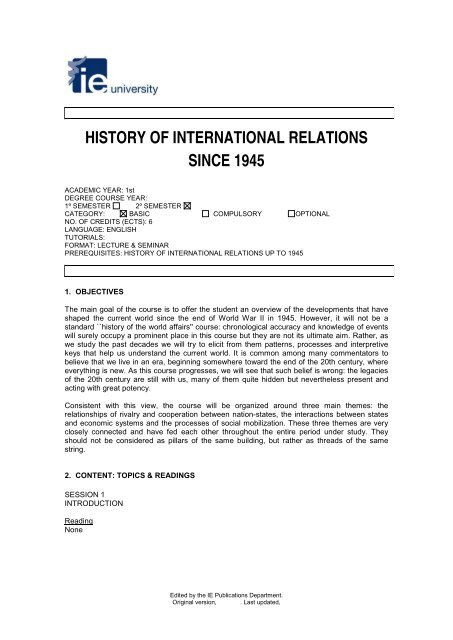
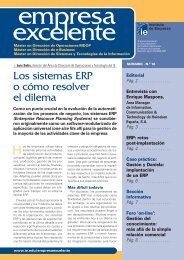
![Change Management Workshop Program Brochure[pdf] - IE](https://img.yumpu.com/22502183/1/184x260/change-management-workshop-program-brochurepdf-ie.jpg?quality=85)
